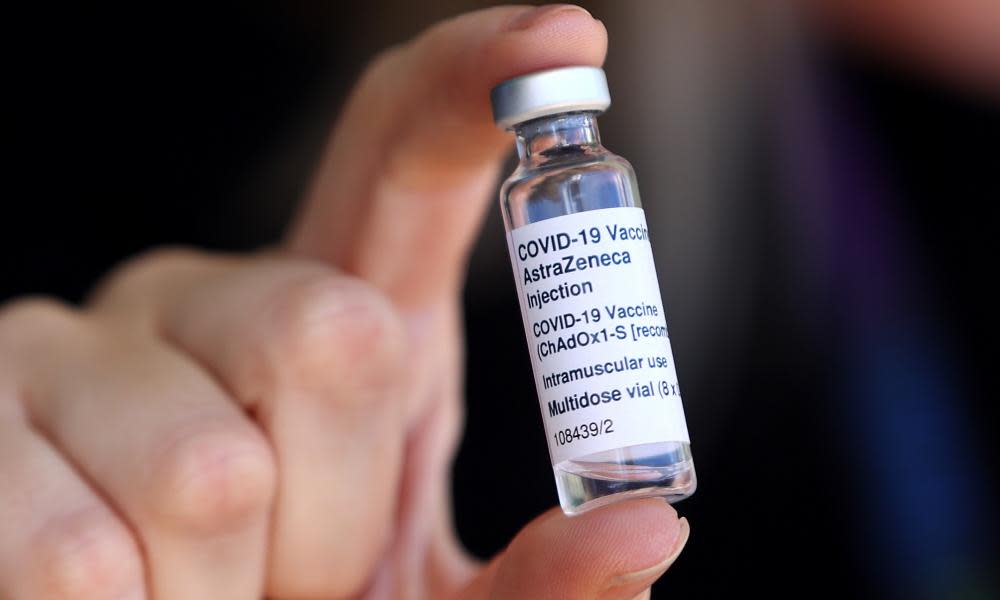Vaccine advisory group urged Australian health department in 2020 ‘to get as much as you can’

Australia’s health department was urged by the government’s vaccine advisory group to order as many Covid-19 vaccines as possible from different sources after a meeting in August last year.
The health department secretary, Prof Brendan Murphy, said on Friday that the government’s procurement strategy was based on advice from the Science and Industry Technical Advisory Group (Sitag) – a group he chairs – as he sought to deflect criticism of the troubled vaccine rollout.
The comments disgruntled some members of Sitag. Multiple sources have told Guardian Australia that the group was asked to provide feedback on a procurement strategy that had already been prepared by the department after its negotiations with pharmaceutical companies.
The strategy, which was formulated around the limited supply deals available to the Australian government at the time, was presented to Sitag for feedback at its first meeting in August last year.
“We were presented with options and we gave our views on them. We did not say to them prospectively, we think this is what you need to do,” one member of the group said. “Across all of the vaccines, we said get as much as you can.”
Related: The Morrison government has fallen short in all areas of the Covid vaccine rollout | Greg Jericho
By this time, many other countries had already inked vaccine supply deals with both AstraZeneca and Pfizer, with the US and the UK announcing vaccine procurement agreements as early as May.
At its first meeting, the Sitag committee agreed to the government’s plan to pre-purchase vaccines from AstraZeneca, Novavax, and Pfizer, with the ability to manufacture the AstraZeneca vaccine in Australia deemed a key priority to ensure self sufficiency.
It also agreed to back the University of Queensland vaccine still in nascent stages of development, which was later abandoned because of a false HIV positive that emerged in trials.
At that stage, there were still doubts around the efficacy of mRNA vaccines – such as those being developed by Pfizer and Moderna – which had not previously been used successfully in humans.
Despite these doubts, the committee agreed to a “strategic” purchase of 10m Pfizer vaccines as part of Australia’s rollout strategy in an attempt to diversify the portfolio and spread risk.
At this point in the government’s deliberations, it was already clear that global demand would outstrip supply, with members of the panel expressing the view that Australia needed to secure as many vaccines as possible across all vaccine types as quickly as possible.
“The strategy was right. Could it have happened earlier? I suspect the answer is yes,” one panel member said.
Another member of the group said that the Sitag advice was based on what had been prepared by the department and the options that were available.
“It was, ‘here are the options, here is what we can and can’t get at this point in time’.”
This panel member said that the portfolio of vaccines agreed upon was “reasonable” based on available evidence at the time, with an emphasis on trying to achieve self-sufficiency through AstraZeneca, which was the only vaccine that could be manufactured in Australia.
Asked to describe the group’s deliberations, another member said departmental officials supplied supporting material to the advisory group, including briefs, reports by consultants, and updates about what vaccine manufacturers were offering Australia.
According to this account, the advisory group was given information, which prompted dialogue among the experts – including whether or not mRNA vaccines would ultimately work – but the government ultimately made the decisions.
“We had conversations about it like a bunch of mature adults, our thoughts went back and then the government made decisions,” one participant said.
The pushback from Sitag members comes after Murphy told parliament’s Covid committee on Friday that all of the government’s vaccine purchases “were on the advice of the Science and Industry Technical Advisory Group”.
“Those decisions were made on the best expert medical advice at the time, and government has stuck with the advice that Sitag has provided,” Murphy said.

As the government comes under sustained criticism for its handling of the vaccine rollout, a report on a pharmaceutical industry website BioPharmaDispatch.com published on Tuesday said there had been frustration with the Department of Health’s “inaction” early in 2020, prompting a staffer from the prime minister’s office to intervene.
A spokesman for the department said it rejected connotations in the article that “vaccine procurement was anything but a priority”.
“The Department of Health actively engaged in the procurement of vaccines in 2020,” he said.
Related: Who’s behind Australia’s anti-lockdown protests? The German conspiracy group driving marches
“Contrary to other media reports, this included with Pfizer very early in the pandemic—the Department’s first meeting with Pfizer was on 10 July, while the Covid-19 vaccine candidate was in Phase 1 clinical trials, and there have been 11 formal meetings and numerous other ad hoc phone engagements with the company.”
The department said that Sitag had met five times to consider in detail the latest data on the Pfizer vaccine and since its inception had “regularly considered the vaccine development landscape, current clinical evidence and provides its advice in that context”.
“The brief given to Sitag was to provide full and frank advice on the overall strategy for vaccine and treatment procurement,” the spokesperson said.
“Sitag advised, from the outset, on the importance of a diverse portfolio of vaccines, with a focus on local production (to ensure early supply), proven technologies and strategic investments in a range of vaccines that were in trial.
“Sitag believes that its recommendations were appropriate for the circumstances and landscape at each time purchasing decisions were made.”

 Yahoo News
Yahoo News 
